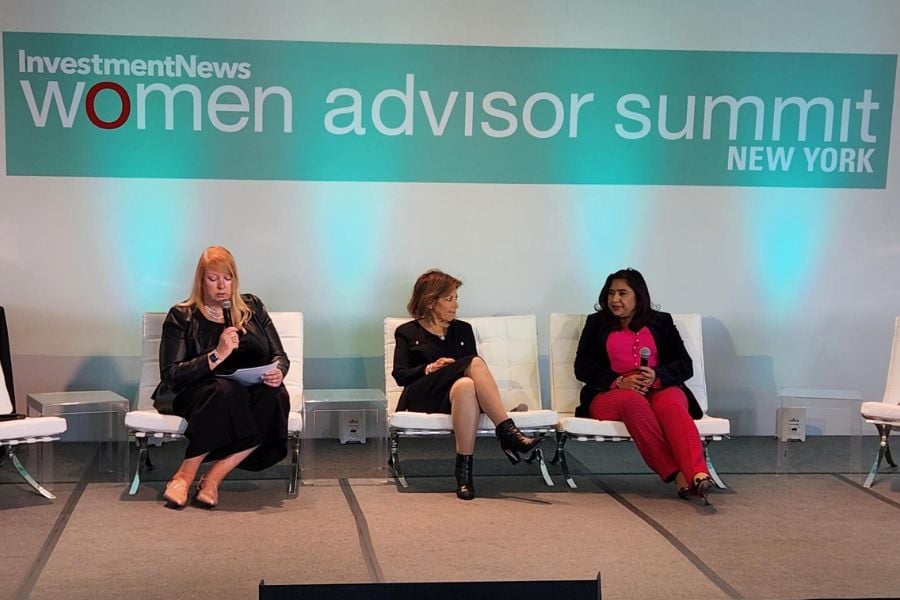

The InvestmentNews Women Advisor Summit in New York Wednesday began not only with a bang, but with a rejection of the unfair questions so often asked of female business owners.
Mandy Gilbert, entrepreneur and author, opened the summit by discussing the challenges of working in male-dominated industries. She started by recounting the demeaning questions women entrepreneurs often face as they grow their businesses, questions like, “Did you start this business with your husband?” or “Did your father start it?” and “How do you manage the business while keeping up with your house duties?”
Gilbert then discussed the obstacles that female entrepreneurs and CEOs need to overcome on the way to success. Most importantly, she pointed out that entrepreneurs “cannot do it all themselves.” In her view, they need to bring in qualified people and welcome their help, which is why “inclusive decisionmaking” is so vital for growing a business.
“Being an inclusive leader is not only the right thing, it’s critical for success,” Gilbert said.
She warned the attendees not to be crippled by the “fear of making a mistake,” and as a result micro-managing a business to death.
“If this is showing up, you have to let go,” said Gilbert. “You will only be as successful as you effectively delegate.”
Gilbert’s keynote was followed by a panel on leveraging who you are to drive results, which was led by Liz Manibay, director of management consulting at Charles Schwab.
The panel included Haleh Moddasser, partner at Stearns Financial Group, Sibyl Slade, financial advisor at IntegriVest, Jennifer Kenning, CEO of Align Impact, and Paula Nangle, president of Marshall Financial Group.
During the discussion, Kenning remembered the circumstances when she told her then-boss of her plans to leave and start her own business. She said she would have left earlier, yet didn’t have the confidence at the time. Kenning also discussed how she had to overcome mental illness to succeed and that business owners need to realize the prevalence of mental illness in society as a whole.
“Somebody that you know is struggling right now,” Kenning said.
Moddasser discussed how she took time off to raise a family before growing her business and explained how that benefitted her in the long run, even though it felt difficult at the time.
She also commented on the challenges of working with clients in today’s highly charged political environment. “It’s difficult to work with people with polarized points of view without compromising yourself,” Moddasser said.
Meanwhile, Slade highlighted how having a short-term memory is a positive in business because it allows you to move on after both wins and losses.
“You need to be like Tom Brady. If you get sacked, you need to get back up and move on to the next play,” Slade said.
Tracey Schwartz, director of the wealth management program at Columbia University, led a panel discussion on using the power of authenticity to build a business.
Tiffany Soricelli, CEO of Virtuoso Asset Management, said that knowing who you are also allows advisors to know who they “do and don’t want to do business with.”
Kim Bourne, managing director of Playfair Planning Services, added: “Everyone is not your client, so don’t force it.”
Another panelist, Craig Colvett, co-founder of coach360, started out as a financial planner before becoming a life coach. In his view, vulnerability goes “hand in hand” with authenticity.
“It leads to a deeper connection with clients,” Colvett said. “There are robo-advisors out there and now AI, so vulnerability creates opportunities.”
Finally, Emily Zeigler, director of advanced planning at C&A Financial Group, recounted how she used to hide her parenting from her clients, making excuses when, for example, she had to miss a meeting to care for a sick child. Eventually, however, she realized her excuses were unnecessary because her clients totally understood that she had to attend to her kids and that it wouldn't affect her performance at work.
“At the end of the day, you have to really be who you are, and if your client doesn’t understand that, then maybe they are not the right client,” Zeigler said.

Chasing productivity is one thing, but when you're cutting corners, missing details, and making mistakes, it's time to take a step back.

It is not clear how many employees will be affected, but none of the private partnership’s 20,000 financial advisors will see their jobs at risk.

The historic summer sitting saw a roughly two-thirds pass rate, with most CFP hopefuls falling in the under-40 age group.

"The greed and deception of this Ponzi scheme has resulted in the same way they have throughout history," said Daniel Brubaker, U.S. Postal Inspection Service inspector in charge.

Elsewhere, an advisor formerly with a Commonwealth affiliate firm is launching her own independent practice with an Osaic OSJ.
Stan Gregor, Chairman & CEO of Summit Financial Holdings, explores how RIAs can meet growing demand for family office-style services among mass affluent clients through tax-first planning, technology, and collaboration—positioning firms for long-term success
Chris Vizzi, Co-Founder & Partner of South Coast Investment Advisors, LLC, shares how 2025 estate tax changes—$13.99M per person—offer more than tax savings. Learn how to pass on purpose, values, and vision to unite generations and give wealth lasting meaning
